|
|
|
Sort Order |
|
|
|
Items / Page
|
|
|
|
|
|
|
| Srl | Item |
| 1 |
ID:
127132
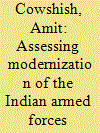

|
|
|
|
|
| Publication |
2014.
|
| Summary/Abstract |
India's quest for modernization of the armed forces is propelled by the persistent threat to its territorial integrity and the aspiration of becoming a great power. However, there is no clearly defined comprehensive policy, much less a carefully crafted strategy, for time-bound modernization of the armed forces and there is no mechanism in place to steer the modernization programme in a holistic manner. In fact, there is considerable ambiguity about the core question as to what constitutes comprehensive 'modernization'. Consequently, it is left to the services to chalk out their own 'modernization' plans.
|
|
|
|
|
|
|
|
|
|
|
|
|
|
|
|
| 2 |
ID:
129999
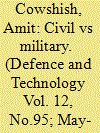

|
|
|
| 3 |
ID:
114277
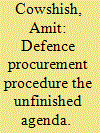

|
|
|
|
|
| Publication |
2012.
|
| Summary/Abstract |
It has been a long time since the first set of instructions on defence procurement was issued in 1992. Since then, however, there have been several refinements and additions, based on the feedback from the stakeholders and the experience of the Defence Ministry itself, culminating in the Defence Procurement Procedure (DPP) 2011. This is presently under review and it would be reasonable to expect that the changes being contemplated will result in further refinement of the procedure and address some of the concerns expressed from time to time. There is also a view that all this effort may go waste once the Public Procurement Bill, presently before Parliament, is enacted, as the law would also apply to defence-related procurements. The apprehension seems unwarranted. The fundamental principles underlying the DPP are not materially different from what is envisaged in the proposed law on public procurement, but the DPP contains detailed instructions and formats of various documents peculiar to defence procurements. Therefore, it is quite likely that the DPP would survive, in some form or the other, the enactment of law on public procurement. Some further changes might be necessary to bring it in sync with the provisions of the new law, but these changes are unlikely to bring about any material change in the overall procedure for capital procurements which has developed over the years. The process of refining the procedure must, therefore, continue. It is in this context that this article highlights some of the issues that have so far not received enough attention or have not been perceived as problem areas meriting attention.
|
|
|
|
|
|
|
|
|
|
|
|
|
|
|
|
| 4 |
ID:
132129
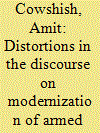

|
|
|
|
|
| Publication |
2014.
|
| Summary/Abstract |
The strategic discourse on defence and security matters in India revolves around familiar themes and sub-themes, ranging from larger issues such as the absence of a clearly articulated national security policy to somewhat fractious issues such as the higher defence management, civil-military relations and modernization of the armed forces.
|
|
|
|
|
|
|
|
|
|
|
|
|
|
|
|
| 5 |
ID:
121144
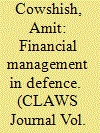

|
|
|
| 6 |
ID:
130090
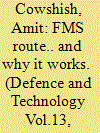

|
|
|
| 7 |
ID:
142684
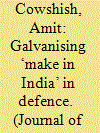

|
|
|
|
|
| Summary/Abstract |
In spite of spending close to Rs 500,000 crore on capital acquisitions between 2002–03 and 2014–15, the Indian Armed Forces continue to suffer from a chronic shortage of equipment and ammunition, low levels of serviceability of equipment already in service, and a heavy dependence on imports. The procurement programmes keep getting stalled or take inordinately long to fructify. There are several reasons for this morass; the primary ones being disjointed defence planning, limited budgetary support for modernisation of the armed forces, procedural complexities, and bureaucratic indolence. Of these, the factor that receives the greatest attention is the procedural complexity besetting defence procurements. The Defence Procurement Procedure (DPP) was first promulgated in 2002 and has been revised several times thereafter by the Ministry of Defence (MoD), in consultation with the users and the industry, but the problems, whether real or perceived, have persisted. More than a year into its five-year term, the present government set up a Committee of Experts (CoE) to address this problem holistically, against the backdrop of its ‘Make in India’ drive. This article presents a perspective on the report of the Committee and ends with a broad approach for phased implementation of the acceptable recommendations of the Committee.
|
|
|
|
|
|
|
|
|
|
|
|
|
|
|
|
| 8 |
ID:
134035


|
|
|
|
|
| Publication |
2014.
|
| Summary/Abstract |
In the run-up to the voting on the budget, detailed demands for grant(DDGs) presented by various ministries to the Parliament are examinedby the departmentally-related standing committees. As Parliamentcannot possibly examine more than 100 DDGs presented to it everyyear, these committees are required to examine them in detail and reportback to the Parliament. One such committee is the Standing Committeeon Defence. This article looks at the manner in which this Committeeexamined the DDGs of the Ministry of Defence (MoD) over a 10-yearperiod from 2004-05 to 2013-14, and the impact of its recommendationson the trajectory of the overall defence budget. This is the first oftwo articles which focuses on the tenure of the 14th Lok Sabha from2004-05 to 2008-09. The second part would cover the tenure of the15th Lok Sabha from 2008-09 to 2013-14.
|
|
|
|
|
|
|
|
|
|
|
|
|
|
|
|
| 9 |
ID:
136775
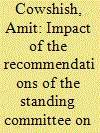

|
|
|
|
|
| Summary/Abstract |
The examination of the detailed demands for grant (DDGs) of the Ministry of Defence (MoD) by the Standing Committee on Defence of the 14th Lok Sabha (2004–05 to 2008–09) and recommendations made by the committee had little impact on the country’s defence budget. While the examination was generally perfunctory, the recommendations were either too general or too impractical to be implemented by MoD. This is the second of two articles that examines how the Standing Committee on Defence of the 15th Lok Sabha (2009–10 to 2013–14) followed the same pattern. Its examination was based on pre-conceived notions about the size of the defence budget and, similar to its predecessor, the recommendations were too general to make any impact on the trajectory of the defence budget.
|
|
|
|
|
|
|
|
|
|
|
|
|
|
|
|
| 10 |
ID:
192915
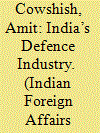

|
|
|
|
|
| Summary/Abstract |
Speaking at the Defence Institute of Advanced Technology (DIAT), Pune,
on May 15, 2023, Defence Minister Rajnath Singh emphasised the urgency
of achieving self-reliance in defence production as continued dependence
on the import of military equipment was affecting the country’s strategic
autonomy. ‘It can’, he added, ‘be a cause for concern for us if our adversary
possesses more advanced technologies’. He was alluding to the potential
threat emanating from indisputable superiority of China in military
technology.
|
|
|
|
|
|
|
|
|
|
|
|
|
|
|
|
| 11 |
ID:
193592
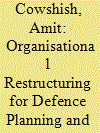

|
|
|
|
|
| Summary/Abstract |
The enduring asymmetry between India’s military capabilities vis-à-vis its adversaries is a matter of concern. The widely held view that it is largely because of the politico-bureaucratic apathy, which manifests itself in the continuing absence of a National Security Strategy (NSS) as the basis for defence planning and inadequate budgetary allocations, needs revaluation. The situation has not changed despite the government having set up a high-level Defence Planning Committee (DPC) in 2018 to inter alia draft the NSS. The budgetary allocations also continue to fall short of the requirement projected by the armed forces. This paper broadly explores these two issues and argues that there is a need to consider the desirability of setting up a 24x7 Defence Planning Board for financially viable defence planning and a bespoke Defence Capability Acquisition Organisation, both of which have been recommended in the past by committees constituted by the Ministry of Defence itself.
|
|
|
|
|
|
|
|
|
|
|
|
|
|
|
|
| 12 |
ID:
114351
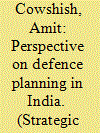

|
|
|
|
|
| Publication |
2012.
|
| Summary/Abstract |
The available literature on defence planning in India does not make for very encouraging reading. A few things stand out. Firstly, there is an acute dearth, if not almost complete absence, of authentic official accounts and analysis of what has gone on in the name of defence planning over the last six decades. Secondly, narratives based either on personal recollection or on opinions and views of those who have directly or indirectly been associated with defence planning at different points of time have filled this void. Others have chipped in too. Many of these opinions and views are based on a subjective interpretation of facts. Thirdly, systemic reforms in the area of defence planning do not appear imminent. The basic problem, of course, is the absence of an official account of defence planning, which has hampered objective analysis and research.
|
|
|
|
|
|
|
|
|
|
|
|
|
|
|
|
| 13 |
ID:
091258
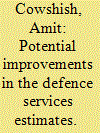

|
|
|
|
|
| Publication |
2009.
|
| Summary/Abstract |
A healthy public discourse could much needed fresh ideas in the management of huge defense outlays. This would be possible only if budget outlays are presented in a demystified format, improving the content of explanatory memoranda so that there is better understanding of the objects on which expenditure is incurred and providing linkages between outlays and outcomes in as many areas as possible, without of course, compromising on security imperatives.
|
|
|
|
|
|
|
|
|
|
|
|
|
|
|
|
| 14 |
ID:
146970
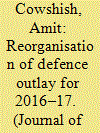

|
|
|
|
|
| Summary/Abstract |
Beginning 2016–17, the Ministry of Defence (MoD) will present four detailed demands for grant (DDGs)1 instead of eight that it had been presenting to the Lok Sabha2 in the past. It is not that its area of responsibility has shrunk. The reason why the number of demands has come down is that the budgetary outlays earlier spread over eight demands have now been compressed into four.
|
|
|
|
|
|
|
|
|
|
|
|
|
|
|
|
| 15 |
ID:
137435
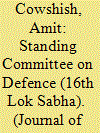

|
|
|
|
|
| Summary/Abstract |
Three months after the National Democratic Alliance (NDA) was swept to power at the centre in the general elections held in April–May 2014 to the 16th Lok Sabha (the lower house of the Indian Parliament), the Standing Committee on Defence was constituted under the chairmanship of Major General B.C. Khanduri (Retd.), former Chief Minister of the northern state of Uttarakhand and a prominent member of the Bharatiya Janata Party (BJP), which is the main constituent of the NDA.
The Committee opened its account with a report on the action taken by the Ministry of Defence (MoD) on the recommendations made by the Standing Committee on Defence of the 15th Lok Sabha on MoD’s Demands for Grant (DGs) for the year 2013–14. This article examines the new Committee’s approach to looking at the issues that had engaged the attention of the Committee in the past
|
|
|
|
|
|
|
|
|
|
|
|
|
|
|
|
| 16 |
ID:
132135
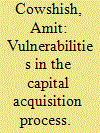

|
|
|
|
|
| Publication |
2014.
|
| Summary/Abstract |
From the stage of inception of a procurement proposal till the signing of the contract, the Ministry of Defence (MoD) diligently follows a fairly elaborate procurement procedure for capital acquisitions, as also for revenue procurements. The purpose of laying down a procedure is to minimize discretion and bring in transparency at every stage to eliminate the possibility of undue influence on decision making. But this does not seem to have worked very well for the MoD as instances of corruption keep surfacing every now and then.
|
|
|
|
|
|
|
|
|
|
|
|
|
|
|
|
|
|
|
|
|